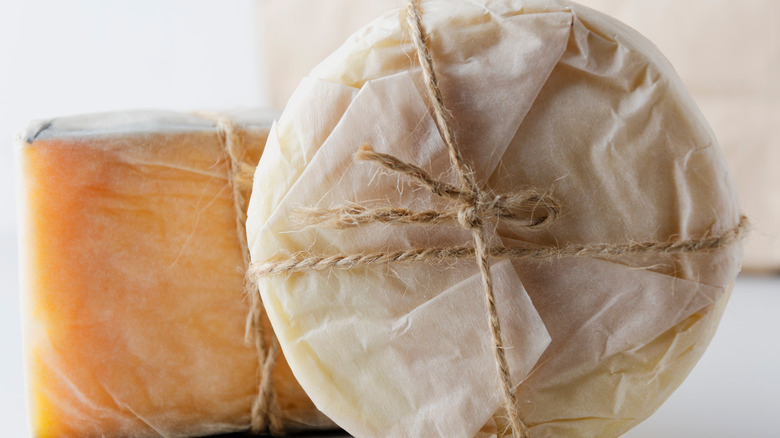Why You Shouldn't Store Cheese At Too Cold A Temperature
Cheese and cheesy dishes rank high on our favorite comfort foods list. During the pandemic, a poll conducted by OnePoll (in conjunction with Farm Rich) found that 55% of those surveyed were consuming more pizza (we all know it's about the cheese), 39% were eating more mac and cheese, and 28% of those polled would name their child Mozz Stick for a lifetime supply of the easy snack food, via The Shelby Report.
Clearly, we love cheese, but we do not necessarily understand it. How often have you had to toss a moldy, sticky, or dried-out piece of cheese? It feels more tragic when it was once a creamy hunk of camembert that now looks like it came from a petri dish or a portion of $25-a-pound Parmesan ominously growing a black beard.
Under such circumstances, you may be inclined to wrap it tighter or keep it colder. But don't! Such harsh conditions can contribute to your cheese's untimely death.
Many kinds of cheese are aged. Even the block cheddar you use for grilled cheese sandwiches is aged for two to three months (via Cabot Creamery). Aging requires specific humidity and temperature levels, which is why caves are suitable for aging cheese, per the Dairy Farmers of Wisconsin. They're cool and humid. Also, the cheese roams free; you will not see cheese in any aging facility wrapped in plastic. As Sydney Willcox, former head cheesemonger at Murray's Cheese, told Insider, cheese needs to breathe.
Colder is not necessarily better for cheese
Conveniently, you can create microclimates that are more suitable housing for your cheeses — spaces warmer and damper than the rest of your refrigerator. Your refrigerator's temperature should ideally be set at 40 degrees Fahrenheit, or slightly below. Cheese, however, is more stable for storage at 42 F to 46 F, according to the cheese school of Paris, Paroles de Fromagers, and they like relative humidity of around 80%. A home refrigerator, meanwhile, varies between 45 to 65% humidity. Fortunately, many vegetable crispers have humidity control and tend to be slightly warmer (per CHOICE).
If you store cheese in a section of your fridge that is too cold, it can lead to dried-out cheese. Further, as Southern Living explains, storing cheese in too-cold conditions can also halt the aging process of certain cheeses like blue cheese, brie, camembert, or any other soft cheese.
Instead, keep your cheese wrapped in parchment, wax, or cheese paper in a plastic bag that is loosely closed, or a glass or food-safe plastic container with the lid ajar. You can place your ad-hoc cave in the crisper or on a shelf closer to the door. Alternatively, if you're a turophile, you can invest in a home cheese vault. Either way, you will never need to cry over lost cheese again.

